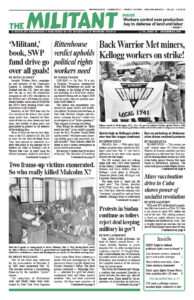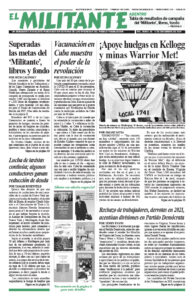Below is an excerpt from a talk by Jack Barnes, national secretary of the Socialist Workers Party, titled “Malcolm X: Revolutionary Leader of the Working Class.” It was given at a March 28, 1987, meeting in Atlanta, and is available in Malcolm X, Black Liberation, and the Road to Workers Power. Copyright 2009 by Pathfinder Press. Reprinted by permission.
I want to make the case that Malcolm X was a revolutionary leader of the working class in the United States. …
[T]he social and political transformations that will be wrought by a popular revolution in the United States — a revolution that will be led by the vanguard of the working class, or else go down to a bloody defeat — are decisive for the oppressed and exploited the world over. Among other things, the conquest of power by the working class and its allies — the establishment of the dictatorship of the proletariat — the necessary step that can open the road for Blacks, and for all supporters of Black rights, to successfully fight to end racist oppression of every kind once and for all.
In the leadership of revolutionary working-class struggles in this country, workers who are Black will occupy a vanguard place and weight disproportionate to their numbers in the U.S. population. That’s what all modern history teaches us. That fact is testified to by the record of powerful social and political struggles in the United States: from battles during the closing years of the Civil War itself; to Radical Reconstruction and the efforts to prevent the imposition of peonage among the freed slaves; to the struggles that built farmers movements and the industrial unions in the 1920s and 1930s; to the mass proletarian movement that toppled Jim Crow segregation, fueled the rise of greater political self-confidence and nationalist consciousness among Blacks in the 1960s, and inspired what became the mass movement against the imperialist war in Vietnam.
Malcolm X was a legitimate political heir to all these struggles.
But who are Malcolm’s heirs?
Following his assassination, some who looked to Malcolm were disappointed because the political organization he founded and led, the OAAU, died with him. Given the enemies they faced, none of the relatively few OAAU cadres Malcolm had brought over from the Nation of Islam were able to step forward to carry on the fight and shoulder the leadership to continue Malcolm’s revolutionary political course. That’s a fact.
But the heirs of Malcolm X will come forward — all over the world, including right here in the United States — as revolutionary struggles advance, as the exploited and oppressed organize to resist the devastating consequences of capitalist crises and imperialist domination and wars. More leaders like Malcolm will come forward, including in the labor movement. And they will need to know who Malcolm was, what Malcolm stood for, what he fought for and dedicated his life to. …
Malcolm correctly insisted that the struggle for Black freedom in the United States is part of an international struggle, a struggle for human rights not just civil rights. He refused to look at America through American eyes, or to look at the world through American eyes. He took his stand from within the oppressed and exploited in the battle for liberation the world over. That was his starting point. And that’s the beginning of wisdom for any revolutionary today.
Malcolm rejected any notion that the oppressed could rely on some common humanity shared with the oppressors, or with a “well-meaning” section of the oppressors. There is no latent supply of love in the “soul” of all human beings, regardless of class, that can be tapped if they’re shamed or pressured — or lobbied or voted for. There is no abstract, classless “humanity”; there is only human solidarity conquered in struggle as a social product of class solidarity, of solidarity in political action among the exploited and oppressed worldwide. The job of revolutionists is not to act “responsibly,” which in class-divided society can only mean “responsibly” toward the rulers, or at least the bourgeois liberals and bourgeois socialists among them. What revolutionists are responsible for is to advance along the line of march toward power of the toilers, who compose the great majority of humanity. …
That’s why Malcolm was an intransigent opponent of the Democratic and Republican parties, an opponent of the two-party system (with its occasional third-party eruptions to blow off steam) that has tied working people to capitalist politics since well before the rise of U.S. imperialism at the close of the nineteenth century.

